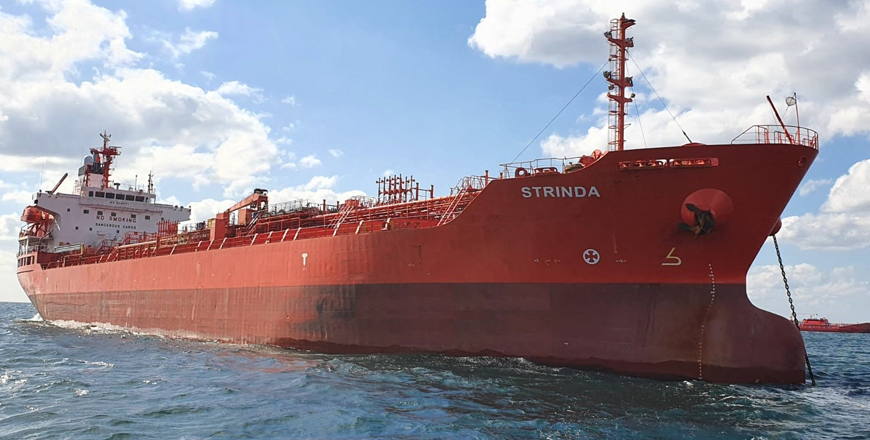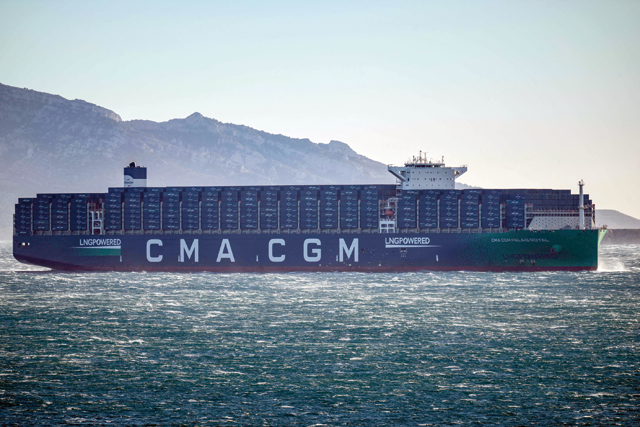You are here
Shipping firms suspend Red Sea traffic after Yemen rebel strikes
By AFP - Dec 16,2023 - Last updated at Dec 16,2023

This handout photograph released by AS J Ludwig Mowinckels Rederi on December 12, shows the Norwegian-flagged chemical tanker the MT Strinda (AFP photo)
DUBAI — Two of the world's largest shipping firms, Maersk and Hapag-Lloyd, said on Friday they were suspending passage through a Red Sea strait vital for global commerce, after Yemeni rebel attacks in the area.
The Iran-backed Houthis, who control much of Yemen but are not recognised internationally, say they're targeting shipping to pressure Israel during its two-month-old war with Hamas fighters in the Gaza Strip.
The maritime tensions have added to fears that the Gaza conflict could spread.
German transport company Hapag-Lloyd said it was halting Red Sea container ship traffic until December 18, after the Houthis attacked one of its vessels.
"Hapag-Lloyd is interrupting all container ship traffic across the Red Sea until Monday," the company said in a statement sent to AFP.
The Danish firm Maersk made a similar announcement, a little earlier.
"We have instructed all Maersk vessels in the area bound to pass through the Bab Al Mandab Strait to pause their journey until further notice," it said.
Maersk said this followed a "near-miss incident involving Maersk Gibraltar yesterday" as well as Friday's attack, in which the rebels struck a Hapag-Lloyd cargo ship in the Red Sea.
A US defence official identified it as the Liberia-flagged Al Jasrah, a 368-metre container ship built in 2016.
"We are aware that something launched from a Houthi-controlled region of Yemen struck this vessel which was damaged, and there was a report of a fire," the official told AFP, speaking on condition of anonymity so that he could discuss intelligence matters.
The US Central Command in the Middle East (CENTCOM) confirmed on X, formerly Twitter, that "a UAV" l struck the Al Jasrah causing a fire that was successfully extinguished.
Vessel seized
A Hapag-Lloyd spokesman told AFP: "There has been an attack on one of our ships."
It was en route from the Greek port of Piraeus to Singapore. There were no casualties and the ship was travelling onward to its destination, he added.
Later in the day during a pro-Palestinian rally in the Yemeni capital, Sanaa, the rebels said they attacked two other ships in the area.
"Container ships MSC Palatium and MSC Alanya were targeted by two naval missiles as they were heading toward the Israeli entity," Houthi military spokesman Yahya Saree said in a broadcast on the rebels' television channel.
The rebels said that, in an earlier attack, the Maersk Gibraltar vessel was “targeted with a drone and the hit was direct”. According to a US official, the missile missed.
Saree said the attack came after the ship’s crew “refused to respond to the calls of the Yemeni naval services”, and that it was intended as retaliation for the “oppression of the Palestinian people”.
CENTCOM said that the MSC Alanya was only threatened but not struck, while the Palatium was hit by one of two ballistic missiles fired.
In a statement posted December 9 on social media, the Houthis said they “will prevent the passage” of ships heading to Israel, regardless of ownership, if food and medicine are not allowed into besieged, Hamas-ruled Gaza.
On Tuesday, they claimed responsibility for a missile strike on a Norwegian-flagged tanker.
Last month, they seized an Israel-linked cargo vessel, the Galaxy Leader, and its 25 international crew members.
Germany’s Foreign Minister Annalena Baerbock on Friday said the Houthi attacks “endanger not only Israel’s security” but also international shipping routes.
Speaking in Tel Aviv, United States National Security Adviser Jake Sullivan expressed similar concern and said Washington is working with the international community “to deal with this threat”.
Oil, gas route
Asked at a press conference in Oslo about the potential for broader conflict after the Houthi attacks, Saudi Foreign Minister Prince Faisal bin Farhan said: “Our region is very complex and we do not need any other conflicts to erupt.”
A Saudi-led military coalition has for years backed the Yemeni government against the Houthis, but a United Nations-brokered ceasefire has largely held since expiring over a year ago.
Iran’s Defence Minister Mohammad-Reza Ashtiani warned on Wednesday against the possible deployment of multinational forces in the Red Sea, which he said would lead to “extraordinary problems”, the ISNA news agency said.
The attack on the Al Jasrah occurred near Bab Al Mandab, the narrow strait between Yemen and northeast Africa through which around 20,000 ships pass annually.
The area leads to the Red Sea, Israel’s southern port facilities and the Suez Canal, making it part of a strategic route for Gulf oil and natural gas shipments.
The Houthis have declared themselves part of the “axis of resistance” of Iran-affiliated groups.
Western warships are patrolling the area and have shot down Houthi missiles and drones several times.
Related Articles
PARIS — Two more major shipping firms, Mediterranean Shipping Company and CMA CGM, said on Saturday they were suspending passage through a R
DUBAI — The United States on Monday said it was setting up an international maritime coalition to counter escalating attacks by Yemen's Hout
DUBAI — Yemen's Iran-backed Houthi rebels said on Monday they had attacked two "Israeli-linked" vessels in the Red Sea in solidarity with Ga



















